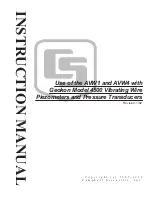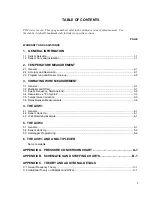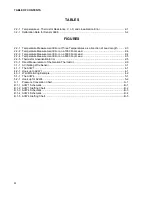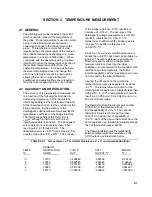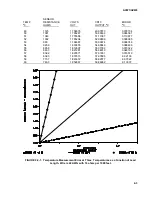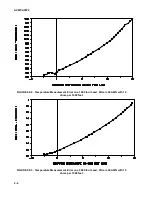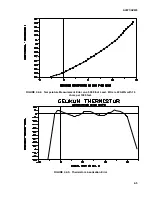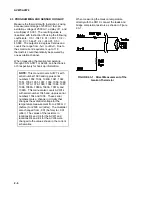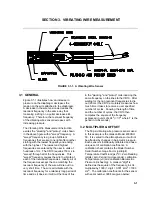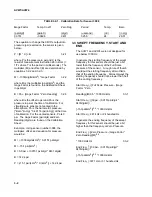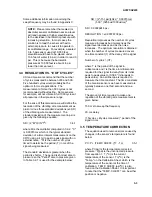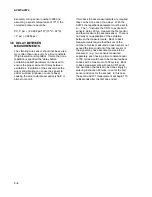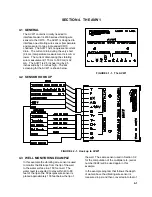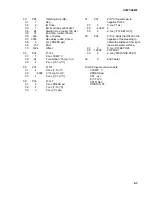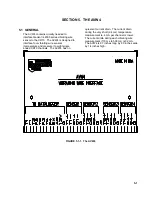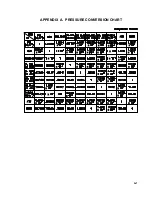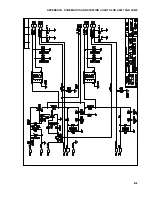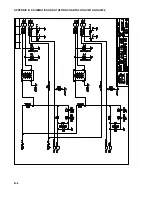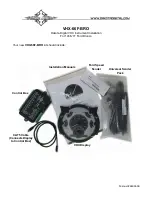
AVW1/AVW4
3-3
Some additional information concerning the
swept frequency may be found in Appendix C.
NOTE:
Please remember that sealed (or
absolute) sensors calibrated near sea level
will read negative at higher elevations due
to the decrease in barometric pressure with
increasing elevation. In most cases the
solution is to load the sensor with extra
external pressure to cause it to operate in
its calibrated range. For example, a sealed
0 to 5 psi sensor used at 10,000 feet
elevation would have to be placed under
10.6 feet of water (4.6 psi) in order to read 0
psi. This is because the barometric
pressure at 10,000 feet is about 4.6 psi
lower than at sea level.
3.4 RESOLUTION VS. "# OF CYCLES"
CSI and Geokon recommend that the number
of cycles measured be between 200 and 500.
Five hundred cycles would probably be the
optimum for most applications. The
measurement of more than 500 cycles is not
recommended without testing. Some sensors,
for example, will not vibrate a full 1000 cycles at
all pressures in their pressure range.
For the sake of this discussion we will define the
resolution of the vibrating wire measurement as
plus or minus three standard deviations (
±
3 SD)
of the vibrating wire measurement. The
standard deviation of the measurement in psi is
given by the following equation:
SD = (2*M*C)/(N*T
3
)
3.4-1
where M is the multiplier computed in 3.2-2. "C"
is 0.00015 ms which is the typical standard
deviation of a time interval measurement on the
CR10 using a 4 mV peak to peak signal with no
external noise. "N" is the number of cycles
timed to determine the period (T) in ms of the
signal being measured.
The standard deviation is greater when the
period is shorter. The period is shortest at zero
pressure so the "Period" at zero pressure given
in Table 3.2-1 is used for the example below:
SD = (2*-15.1psi/(kHz
2
) * 0.00015ms)
(500 * (325.6us/1000us/ms)
3
SD = 0.00026246 psi
RESOLUTION = ±
0.00078738
psi
Resolution improves as the number of cycles
measured increases but it worsens as the
signal level decreases and as the noise
increases. The optimum resolution is obtained
when the number of cycles measured covers
one time constant (
τ
) of the decay of the signal.
Number of cycles = (
τ
/T)
where T is the period of the signal in
milliseconds and
τ
is the time in milliseconds
required for the signal to decay from its initial
peak to peak value to (0.368 * initial peak to
peak value). An oscilloscope is required to
measure the time constant. The time constants
of the Geokon sensors we have measured are
typically between one third second and one
second.
The amount of time required to make one
repetition of the vibrating wire measurement is
given below:
150. ms to sweep the frequency
20. ms delay
(1.5 #cycles measured) * period of the
signal in ms
3.5 TEMPERATURE CORRECTION
The equation used to remove errors caused by
changes in the sensor's temperature is found
below:
Pt = P + (TEMP. COEFF.)*(T - To)
3.5-1
where Pt(psi) is the temperature corrected
pressure. P(psi) is the uncorrected pressure
from equation 1. T(
o
C) is the current
temperature of the sensor. To(
o
C) is the
"Temp." on the Calibration Sheet which is the
temperature of the sensor at the time of
calibration. TEMP. COEFF.(psi/
o
C) is also
found on the Calibration Sheet. It is important
to note that the "TEMP. COEFF." can be either
positive or negative.
Summary of Contents for AVW4
Page 20: ...AVW1 AVW4 4 4 This is a blank page ...
Page 24: ...AVW1 AVW4 5 4 This is a blank page ...
Page 25: ...A 1 APPENDIX A PRESSURE CONVERSION CHART ...
Page 26: ...This is a blank page ...
Page 27: ...B 1 APPENDIX B SCHEMATICS AND STUFFING CHARTS FOR AVW1 AND AVW4 ...
Page 28: ...APPENDIX B SCHEMATICS AND STUFFING CHARTS FOR AVW1 AND AVW4 B 2 ...
Page 29: ...APPENDIX B SCHEMATICS AND STUFFING CHARTS FOR AVW1 AND AVW4 B 3 ...
Page 30: ...APPENDIX B SCHEMATICS AND STUFFING CHARTS FOR AVW1 AND AVW4 B 4 ...
Page 31: ...APPENDIX B SCHEMATICS AND STUFFING CHARTS FOR AVW1 AND AVW4 B 5 ...
Page 32: ...APPENDIX B SCHEMATICS AND STUFFING CHARTS FOR AVW1 AND AVW4 B 6 This is a blank page ...
Page 34: ...This is a blank page ...
Page 35: ...This is a blank page ...

